By Mohlomi Maubane
SOWETO, South Africa — “Why the f**k did he not do that at West Ham!!!” reads a YouTube comment in response to the video clip above featuring Benni McCarthy’s superb free kick in the 2011 Telkom Cup quarterfinal between Orlando Pirates and Moroka Swallows. This is the best goal I have seen in the PSL era: an extraordinary strike in a tense match Pirates were losing by a goal to nil. And while Swallows players were still scratching their heads in bewilderment, he got a second and sealed the match.
West Ham were the last European team McCarthy played for in a chequered 14-year European career whose highlight was a 2004 UEFA Champions League medal with FC Porto under Jose Mourinho. A sometimes controversial character who had endless run-ins with the South African Football Association, Benni set tongues wagging in the local football scene when he decided to return to South Africa. Some critics believed he was over the hill while others knew he still had something to offer. The man himself said he still had a lot of football in him, and with the right service, he would excel. At Orlando Pirates, he found the perfect setting to shine although he would have to do it without Dutch coach Ruud Krol who had just left after three years at the helm.
The Mighty Bucs boasted one of the best squads in the country and were brimming with confidence after winning a treble the previous season. Krol’s long term (at least in South African terms) afforded him the required time to build a team and mould plentiful talent in service of the collective. Team-play became paramount above all else, and prima donnas were booted out. The defense became mean. Opponents learned the hard way that beating Pirates meant playing to the final whistle. For example, in a November league game against Swallows. The Dube Birds looked set for a 1-0 victory, but as my friend Katiso Motaung wryly noted, Pirates managed to turn defense into attack and Jele equalized in the nanoseconds it took the referee to lift the whistle to his mouth to blow full time.
Tag: South Africa
Benni Leads Orlando Pirates to PSL Title
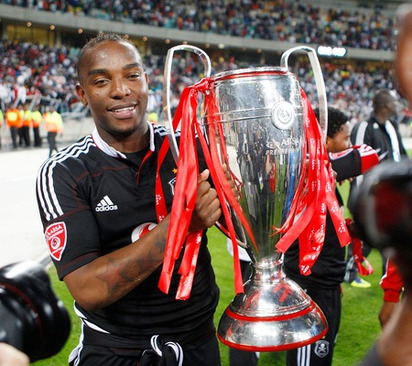 Benni McCarthy’s two second-half goals earned Orlando Pirates their second consecutive Premier Soccer League title. It was sweet revenge for McCarthy writes Rodney Reiners in the Cape Argus, “He’s been put down, trampled on, ridiculed, and dismissed as an over-weight, over-rated charlatan more often than any footballer should have to endure. Yet, each time, the 34-year-old Cape Town-born striker has come back to splatter copious bowls of beaten egg on the faces of his critics.”
Benni McCarthy’s two second-half goals earned Orlando Pirates their second consecutive Premier Soccer League title. It was sweet revenge for McCarthy writes Rodney Reiners in the Cape Argus, “He’s been put down, trampled on, ridiculed, and dismissed as an over-weight, over-rated charlatan more often than any footballer should have to endure. Yet, each time, the 34-year-old Cape Town-born striker has come back to splatter copious bowls of beaten egg on the faces of his critics.”
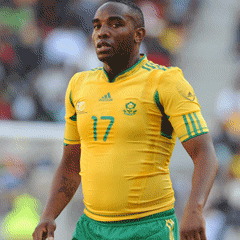 McCarthy — the most prolific scorer in Bafana Bafana’s history — has experienced a rebirth since the humiliation of being left off the 2010 World Cup squad for lack of fitness (see photo).
McCarthy — the most prolific scorer in Bafana Bafana’s history — has experienced a rebirth since the humiliation of being left off the 2010 World Cup squad for lack of fitness (see photo).
Pirates went into the tense closing Saturday with a two-point lead over Soweto rivals Moroka Swallows. Both contenders took care of business in their away matches in KwaZulu-Natal: Bucs beating Golden Arrows 4-2 at Durban’s monumental but seldom-used Moses Mabhida stadium (highlights here); The Birds winning 1-0 at Maritzburg United’s more humble and intimate Harry Gwala stadium.
Smiling broadly, Benni McCarthy told Ryan Cooper of Kick Off magazine: “I’m doing the thing I love most, and that is playing football. The haters out there . . . next year I’m gonna keep coming back with more!”

The football skills of Richard W. Msimang, a prominent early member of the now 100-year-old African National Congress in South Africa, were reportedly as sharp as his legal mind and political acumen. Last year on this blog I posted a portion of an article published in a 1913 issue of the ANC’s newspaper Abantu Batho (given to me by Peter Limb) that provided a glimpse into Msimang’s sporting past as a student in South Africa and Britain.
Born in Edendale, a freehold black area on the outskirts of Pietermaritzburg, KwaZulu-Natal, a community with a well-deserved reputation for defiance of colonial authority, Richard and his brothers Selby and Herbert grew up refusing to be black servants of white masters. Sport, formal education, and political activism channeled the enlightened self-interest of the Msimangs much like they informed the 20th-century South African struggle for political and cultural empowerment. Thanks to the kindness and generosity of Geoff Bisson (Queen’s College, Taunton), Brian Willan (Rhodes University), and once again Peter Limb, I can now share additional evidence of Richard Msimang’s prowess on the football and rugby pitch.
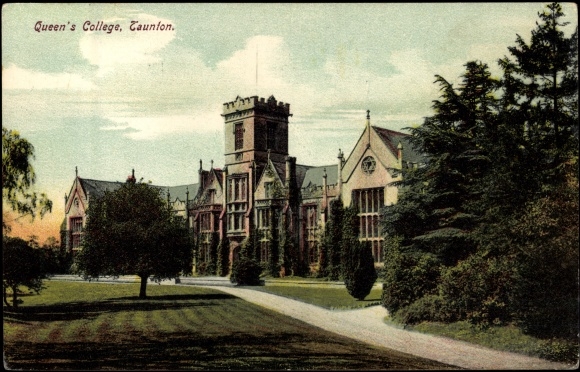 The revealing passage below focuses on Msimang’s time at Queen’s College, Taunton (see postcard), a boarding school in the West of England. In his book History of Queen’s College, Taunton (Taunton, England: Old Queenians’ Association, 1957; p. 157), H. J. Channon writes:
The revealing passage below focuses on Msimang’s time at Queen’s College, Taunton (see postcard), a boarding school in the West of England. In his book History of Queen’s College, Taunton (Taunton, England: Old Queenians’ Association, 1957; p. 157), H. J. Channon writes:
On a cold, wet afternoon in November, 1904, a few of us were practising shooting at goal on the Lower. We noticed a dark figure, in a bowler hat and a heavy black overcoat, standing on the terrace watching us. It was the first day at Queen’s of a Zulu, R. W. ‘Msimang. He passed through the gap on to the field. The soccer ball was thrown to him, and he could not resist the temptation of racing towards it. Unfortunately for him the ball stopped just in front of a deep pool. Through the water ‘Oomsi dashed, slipped and sat down, with his bowler floating away from him. We took him up to the Linen Room for a complete change of clothes. His charming smile we saw for the first time it never seemed to desert him. In his own country he had played a lot of soccer, but on the hard grounds he had never worn boots. It was not long before he was in the first XI, and at first when the ground was hard he dispensed, with football boots. I can see him now dashing down the left wing to the corner flag and middling the ball with perfect accuracy. After several years he was articled to a Taunton solicitor, but continued to live at the school. He took up rugby, and became the most popular player Taunton has ever had. The crowd loved to see him emerge with a smile from the bottom of a heap of forwards. He was a brilliant scrum-half [fly half according to Willan], tough and with a swerve that made it difficult to bring him down. So popular was he, that sometimes he had to leave the ground by a back exit to avoid the crowd. After he had passed his final law examination he returned to South Africa, where he became a State Attorney under the Transvaal Government.
Spotlight on African Coaches
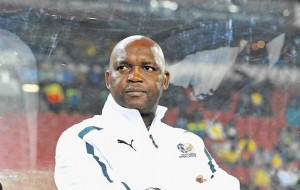
Editor’s Note: This post begins a multi-part series on African coaches.
Continuing with Pitso is Regressing
Guest Post by Mohlomi Maubane
SOWETO, SOUTH AFRICA — In a recent issue of Kick Off, South Africa’s leading soccer magazine, Editor Richard Maguire argued against firing Bafana Bafana coach Pitso Mosimane (in photo above). Pitso, of course, is singularly responsible for South Africa’s embarrassing failure to qualify for the 2012 African Nations Cup finals (aka The Comedy in Nelspruit). I have been collecting Kickoff since high school. As a magazine, it expects vision, competence and innovation from every member of the South African football fraternity; hence the editorial vouching for Pitso to stay on as Bafana Bafana coach was surprising.
The crux of Maguire’s argument is that Mosimane should remain in charge for the sake of continuity. I say there should not have even been a beginning. Mosimane’s coaching success has been overblown. At club level, he led well-endowed Supersport United to five cup finals, losing three, and at national team level he was an assistant coach during a mediocre run from 2006 to 2010, when Bafana sunk to 90th in the FIFA World Rankings.
The ridiculous manner in which South Africa failed to qualify for the 2012 African Nations Cup finals showed Mosimane to be as unprofessional as his employers. How can a national coach fail to read or grasp competition rules? This is a man who thinks of himself as a “modern” coach always in step with the latest developments in the world game. Perhaps common sense is not part of the curriculum of the courses Mosimane often brags of attending. And for all his supposed keeping abreast with the latest trends in the game, Mosimane’s idea of “global football” is confined to the English Premier League and La Liga.
SAFA appointed Pitso Mosimane as Bafana Bafana coach soon after the 2010 World Cup. At the time, there was talk of the dawn of a new era in South African football. In truth, there was the usual lack of specific detail on how to make this new epoch come about. Instead, SAFA officials spoke at length about Vision 2014, Bafana Bafana’s campaign to qualify for the World Cup in Brazil. The seven other national teams under SAFA’s auspices were left unmentioned. Now, a year after the Vision 2014 was unveiled, we are a joke in the football world.
More than anyone else, it was Mosimane’s job to ensure Bafana qualified for 2012. He was entrusted with the troops and should have known the rules of engagement. When he was introduced as the new Bafana coach after the World Cup, Mosimane was his typical pompous self, saying he did not expect favors from anyone, he knew his mandate, and that he wanted to be judged by the results. Here are the Nations Cup results: 2 wins, 3 draws, and 1 loss, 4 goals scored, 2 against. Having failed to qualify, his story has now changed. In his first press conference after the Comedy in Nelspruit, Mosimane had the audacity to say he did not fail because South Africa finished top of their group! That Bafana actually failed to qualify was in the past; it was time to move on, he said.
Indeed it is time to move on, and perhaps it is best to do so with a coach who reads and understands the rule book; one whose trophies and coaching acumen supersede his chest-thumping bravado. Pitso Mosimane has been in the national structures for more than five years and South African football would not be served well by a continuation of his underachievement.
If Mosimane were a football journalist and wanted to write for Kick Off, I suspect Maguire would send him away with the disdain he probably feels when the magazine has to document yet another SAFA cock-up.
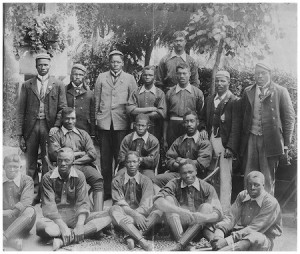 In Making History, a BBC Radio 4 series exploring ordinary people’s links with the past, we learn about the first African team to play in Europe. Making History listener Eryl Freestone has a memoir written by her grandfather which describes a tour of black South African footballers that he helped organize in 1899, just as the South African War was about to start. Eryl meets with Chris Bolsmann at Aston University who has been researching the tour and was desperate to find an ancestor of WM Williams’ – Ery’s grandfather.
In Making History, a BBC Radio 4 series exploring ordinary people’s links with the past, we learn about the first African team to play in Europe. Making History listener Eryl Freestone has a memoir written by her grandfather which describes a tour of black South African footballers that he helped organize in 1899, just as the South African War was about to start. Eryl meets with Chris Bolsmann at Aston University who has been researching the tour and was desperate to find an ancestor of WM Williams’ – Ery’s grandfather.
Listen here (segment starts at 09:00).
Bafana Buffoonery
South African players embarrass themselves and the nation by dancing in celebration after a 0-0 home draw with Sierra Leone on October 9, 2011 in Nelspruit. Niger had qualified instead! (For details see yesterday’s post here.)
The Mighty Bucs Reign Supreme
By Mohlomi Maubane in Soweto, South Africa
A few days before the 2010 World Cup kicked off in South Africa, the New York Times Magazine published an insightful piece on football development focused on Ajax Amsterdam’s famous youth academy. “How a Soccer Star is Made” by Michael Sokolove is a must read for the myopic beings who masquerade as the game’s sole custodians in South Africa and who have turned fiddling while Rome burns into an art. I was reminded of the NYT article during this past weekend’s dramatic finish of the 2010-2011 PSL season.
In the story, Sokolove recounts his encounter with David Endt, manager of the Ajax first team and a former Ajax player. Endt also serves as the team’s unofficial conscience and historian. His office is a mini-museum and on his desk was a pair of scissors, once allegedly used by an Ajax player to attack a teammate in a dressing room squabble a few decades back.
If Orlando Pirates — the Soweto giants crowned PSL champions on Saturday — had a museum, the orange shirt of one of Ajax’s most decorated products would find a place in it. For months, Pirates’ coach Ruud Krol’s bright shirt has been the source of jokes among many soccer scribes in South Africa. However, for Krol, who played 339 games for Ajax and 83 times for The Netherlands (including two World Cup finals), the orange shirt was no laughing matter. Not only is orange his national colour, but it was also a good luck omen. And you sure need a dose of good luck to stay at the helm of the Mighty Bucs.
The last two times Pirates were crowned league champions, the victorious coaches were fired early in the following season. A manager can win the league at Pirates, but if the side is deemed not to be suitably entertaining then he will “part ways with the team amicably.” For all its fascination with the English game, the South African football fraternity has not learned some important lessons from it.
Alex Ferguson has been to these shores three times with his Red Devils in the past twenty years. In that same period, Pirates have employed over thirty head coaches, none serving longer than Krol’s three years. Needless to say, the constant chopping and changing had a negative effect on the team’s performance. Success has come in dribs and drabs, and when the 2010-2011 season started, Pirates had not won a major tournament in eight years.
That ghost was laid to rest in October 2010 as Pirates annexed the MTN 8. At Pirates, however, winning a trophy is a double-edged sword. It does offer some reprieve, but it also heightens expectations. And so when Krol guided the Mighty Bucs to the Telkom Cup final only to lose brutally 3-1 to bitter Soweto rivals Kaizer Chiefs, his head was on the chopping block. In fact, Krol’s head has been on the block every time a point was dropped. But in retrospect, that Telkom Cup derby was the turning point in the Pirates’ season.
In a May 23 radio interview, Krol revealed that at the first training session after the loss to Chiefs in December, he called his players around and told them that, painful as it was, that was not the last loss they were going to suffer in their careers. And anyway, the season was far from over, what was important was how they were going to finish at the end of the season. The team duly heeded his call and went on a sixteen-game unbeaten spree, with Krol egging them on from the sidelines reliably clad in his lucky orange shirt.
With five league matches left to play, Pirates Nation prematurely predicted that “We are going to win the league,” despite several other teams being in the title chase. A 3-0 drubbing by Ajax Cape Town — a club founded in 1999 as a joint venture between Ajax Amsterdam and a South African group — ended the Bucs’ unbeaten run on March 16 . Suddenly, being crowned champions did not look like a foregone conclusion. Pirates won the next two games so that with three games left four teams — Pirates, Chiefs, Ajax, and Sundowns — had a chance to win the league. This was no time to blink.
But Pirates blinked. They lost 1-0 to Supersport at home, and needed a 92nd minute equalizer to draw 1-1 away at Santos. On the final day of the season, the team’s destiny was not in their hands. A win against Maritzburg United at home would hand Ajax Cape Town their first league title. If Ajax drew and Pirates won, however, Pirates would be the champions on goal difference. There was also the small matter of a so-called dark horse in the form of Kaizer Chiefs, arithmetically still in the running.
Despite my initial boycott of PSL games due to the cover charge being doubled at the beginning of the season, I have regularly attended Pirates’ games at Orlando Stadium this season. However, I could not conjure up the courage to go to the stadium for the deciding match this past Saturday for fear of having my heart broken into a million pieces. Too painful to imagine.
But somehow, someway, Ajax failed to muster a win. They led 1-0 at the break, only for Maritzburg to claw their way back finding an equalizer and, lo and behold, taking the lead midway through the second half. Meanwhile in Soweto, Golden Arrows were holding Pirates to a 1-1 draw. Then, in the 84th minute, Isaac Chansa let rip from outside the box with a scorcher of a goal. At Cape Town Stadium, three minutes later, Ajax drew level. One more goal and Ajax would win the title.
It was not to be. Ezimnyama Ngenkani held on and were crowned champions in the most dramatic fashion since the PSL began in 1996-97. When the referee blew the final whistle at Orlando Stadium, he signaled the start of wild celebrations. Thousands of Buccaneer supporters ran onto the pitch to mob Krol. The Dutch coach may not know that supporters mobbed many of his predecessors in years gone by, usually after an undesired result when the messages being passed on were nothing like the pearls of affection lavished on Krol on Saturday.
South Africa in general, and its football fraternity in particular, should learn from Krol’s sojourn at Pirates. As famed playwright Athol Fugard recently reiterated, we pay scant respect to growth: “Everything must be instant — instant sex, instant coffee, instant satisfaction. Nobody is prepared to plant a seed and wait.” There are no short cuts to success. Let’s plant seeds, nurture them, and let them grow. It’s the only recipe for long-term success, and it is the lesson we must learn from Krol’s success with Pirates.
And that orange shirt, which was missing two buttons after the melee at Orlando Stadium, must be framed and hung in the office of the Orlando Pirates Chairman. Football, bloody hell!!
